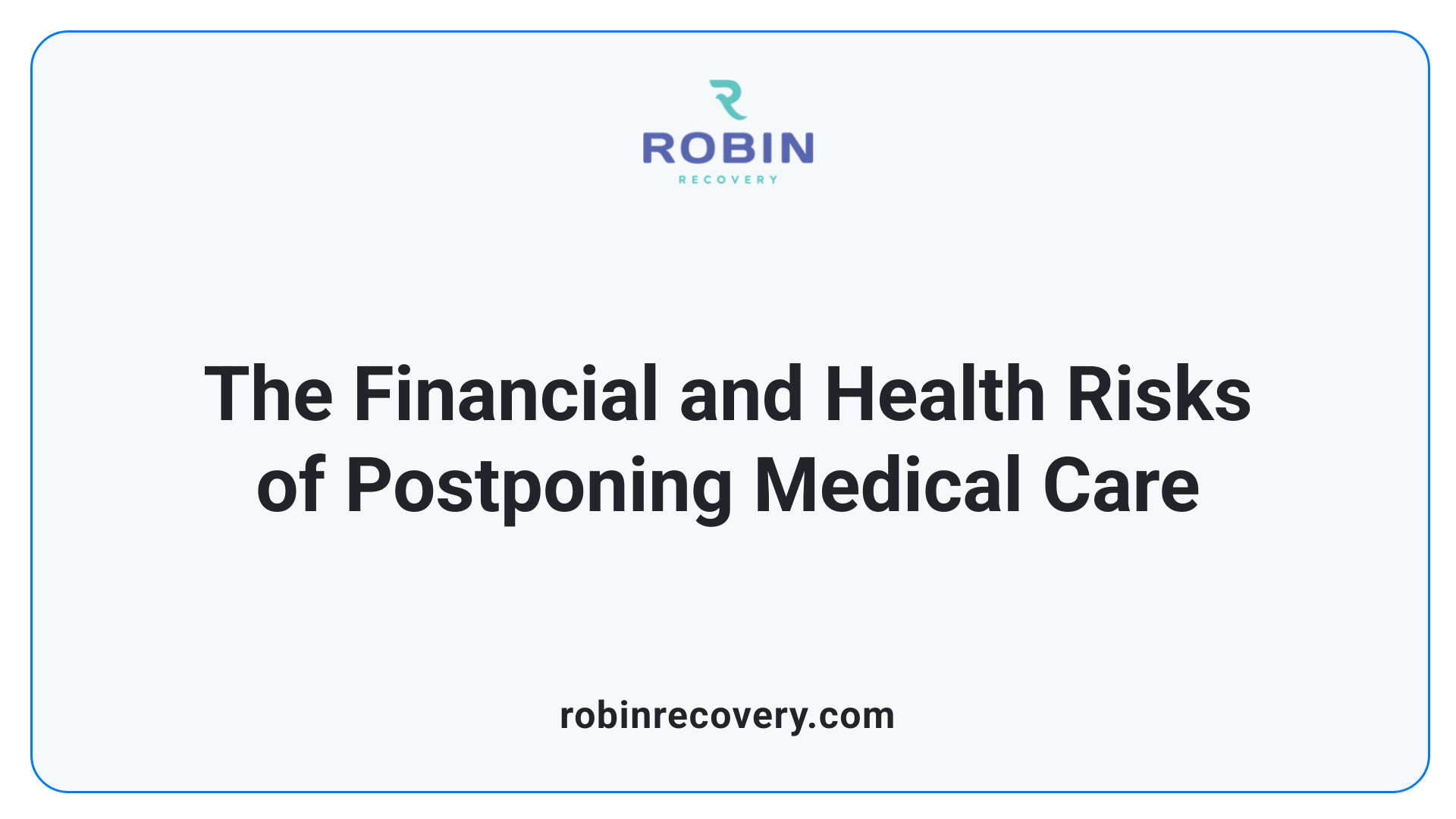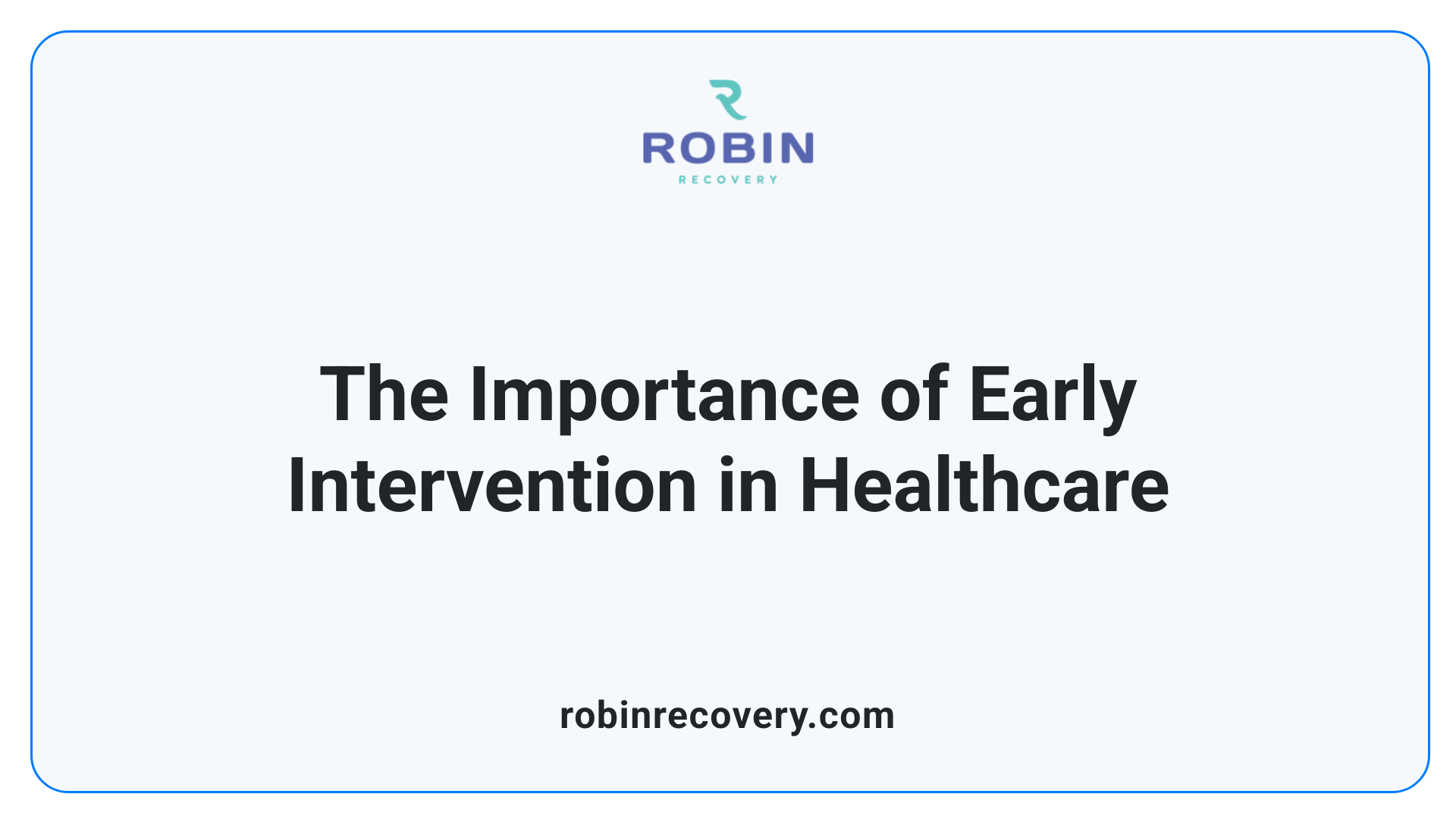How Far to the Bottom? Why Waiting To Get Treatment Is Always a Mistake

Introduction
Exploring the pressing issues surrounding delayed medical treatment, this article will delve into the multifaceted consequences of postponement, from addiction to chronic illnesses. We will examine how waiting affects health outcomes, financial stability, and the broader implications on healthcare systems globally.
Understanding the Implications of Waiting for Treatment in Addiction Recovery

What are the implications of delaying treatment for addiction, and what is the concept of 'rock bottom'?
Delaying treatment for addiction leads to a range of serious consequences that can affect an individual's health, relationships, and finances. When treatment is postponed, addiction often becomes more severe and can result in significant health complications, such as liver damage or mental health disorders like anxiety and depression. These issues can create a downward spiral, worsening the individual’s overall well-being and making recovery even more challenging.
The idea that one must hit a 'rock bottom' before seeking help is a dangerous myth. This misconception can discourage many individuals from getting the support they need, as they may wait for a catastrophic event that might not happen. Addiction manifests differently for everyone, and some may not live to hit that proverbial bottom. Proactive engagement in treatment is crucial, as early intervention can lead to better recovery outcomes.
Studies indicate that prompt treatment can significantly reduce risks related to health, legal, and financial troubles. Delays in seeking care not only prolong suffering but can also increase the likelihood of relationship strain, leading to emotional pain and trust issues with loved ones. Encouraging early intervention can ultimately facilitate recovery, prevent crisis situations, and improve the probability of long-term success.
The Wider Costs of Postponing Medical Treatment

What are the consequences of postponing medical treatment for health and finances?
Postponing medical treatment can significantly impact both health and financial stability. Delays often result in worsening health conditions, which may progress from manageable issues to critical emergencies that require extensive care. For instance, untreated addiction can lead to severe complications like liver damage and mental health disorders, further complicating the individual's situation.
Additionally, the financial implications are notable. Surveys indicate that approximately 40% of adults have chosen to delay necessary care due to associated costs. This decision leads to increased reliance on emergency services, further inflating healthcare costs due to more complex and expensive interventions that could have been managed earlier.
Financial Impact Breakdown
Financial Factor Description Implication Healthcare Costs Increased expenses from late-stage treatments Escalation of overall costs Productivity Loss Diminished ability to work due to health problems Reduced income and stability Debt Accumulation Incurring debt from unpaid medical bills Long-term financial instability
Untreated health issues can also lead to emotional distress, worsening mental health, and strained relationships, creating a cycle of issues that can feel insurmountable. In summary, addressing health concerns promptly not only enhances recovery outcomes but can also prevent financial burdens, framing healthcare as a crucial investment in well-being rather than just an expense.
Barriers to Timely Medical Care and Their Impact

What barriers exist to seeking timely medical care, and how do they impact health outcomes?
There are multiple barriers that can hinder individuals from seeking timely medical care. Among these are:
- Insurance issues: Lack of adequate health insurance is a major barrier. Individuals with severe mental illness or chronic conditions often struggle to obtain coverage, leading to delayed treatment and worse health outcomes.
- Socioeconomic factors: Financial constraints play a significant role, as approximately 40% of individuals report avoiding necessary care due to costs. Additionally, younger people and those without insurance experience more delays in seeking help, which can worsen their health.
- Discrimination: Systemic biases can discourage certain demographic groups, particularly racial minorities, from pursuing medical attention. Such discrimination contributes to feelings of mistrust toward healthcare providers, further exacerbating health disparities.
Delaying necessary medical care can lead to significant complications. Conditions that could have been managed easily may escalate into crises that require more intensive and costly interventions. For instance, untreated cancers or chronic diseases like diabetes often lead to life-threatening complications.
Moreover, the physical and psychological toll of waiting for treatment can add layers of anxiety and emotional distress. Many individuals report that the stress of managing their health conditions without proper care leads to worsened mental health, creating a vicious cycle of deteriorating wellbeing.
Studies over the past two decades indicate these barriers disproportionally affect Black and Latino/Hispanic populations compared to their White counterparts. Addressing these health disparities requires a multifaceted strategy. Improving insurance coverage, enhancing public awareness, and addressing systemic inequities are essential steps toward ensuring better health outcomes for all communities.
Barrier Type Impact on Health Outcomes Population Affected Insurance issues Increased delays in treatment Individuals with low-income Socioeconomic factors Greater risk of severe health crises Younger demographics Discrimination Mistrust leads to avoided care Racial minorities
By tackling these barriers, the healthcare system can improve access to timely medical care and ultimately enhance overall community health.
The Critical Role of Early Intervention and the Pitfalls of 'Active Waiting'

Why is early intervention critical in healthcare, and what are the dangers of 'active waiting'?
Early intervention in healthcare is crucial as it helps to identify and treat conditions before they worsen. By acting swiftly, healthcare providers can enhance recovery odds and even change the course of an individual's health journey. This is particularly true in pediatric care, where early treatments can positively influence developmental outcomes. For instance, timely interventions in cases of mental health crises significantly reduce the chances of chronic disorders developing.
However, reliance on 'active waiting'—the practice of postponing necessary medical care while monitoring a condition—can be perilous. This approach may lead to deterioration, particularly in cases such as addiction or chronic illnesses. Patients often misinterpret the concept of waiting as a safe option, missing opportunities for effective care. Consequently, untreated conditions may exacerbate, manifesting as increased anxiety, severe health complications, or even emergencies down the line
The implications for mental health services
The need for early intervention becomes especially pressing in mental health services. A significant proportion of individuals experiencing mental health issues often delay seeking treatment. This gap is influenced by factors including stigma, lack of awareness, and socioeconomic barriers. Data indicates that nearly 50% of those with major mental illnesses experience delays in access to care, resulting in amplified distress and worsening symptoms.
Moreover, these delays can lead to more costly emergency treatments, further burdening an already strained healthcare system. Access to immediate services and supportive care not only alleviates individual suffering but also serves to mitigate broader societal health disparities.
Timely intervention is foundational to effective healthcare, particularly for vulnerable populations. By combating the misconceptions of waiting and reinforcing the importance of prompt action, we can improve health outcomes and reduce unnecessary suffering.
Timely Interventions for Chronic Conditions: A Lifesaving Necessity

What are the risks of delaying treatment for chronic conditions, and why are timely interventions important?
Delaying treatment for chronic conditions can lead to a cascade of negative consequences. These include the worsening of symptoms and an increased likelihood of serious health complications, such as heart disease, kidney failure, and mental health crises. The progressive nature of many chronic illnesses means that the longer treatment is postponed, the more difficult—and costly—it becomes to manage the condition.
Individuals often face financial barriers to healthcare, such as lack of insurance or concerns about treatment costs, which may lead them to postpone necessary care. Research shows a clear correlation between poorer health and increased delays in seeking medical attention, demonstrating that these delays can significantly worsen health outcomes and even lead to higher mortality rates.
Timely interventions are not just about managing existing ailments; they are crucial for preventing acute crises that require emergency responses. By addressing health issues early on, patients can enhance their well-being and ultimately lower long-term healthcare costs, mitigating the escalating financial burden associated with late-stage treatments.
Access to timely care must also recognize factors like socioeconomic status, as disparities in health equity can exacerbate these risks. As we navigate ongoing challenges like the COVID-19 pandemic, prioritizing systems that promote timely and affordable treatments is more essential than ever.
Factor Impact of Delayed Care Consequences Health Risks Exacerbation of chronic symptoms Serious complications, higher mortality rates Cost Implications Increased reliance on emergency services Higher treatment costs, financial strain Socioeconomic Status Disparities in access to timely care Worsening health outcomes, inequitable healthcare access
Overall, recognizing and addressing barriers to prompt medical treatment is vital for enhancing health outcomes and safeguarding against the escalation of chronic conditions.
Urgency in Treating Liver and Kidney Failures
Consequences of Delayed Treatment
Delaying treatment for liver and kidney failure can lead to dire health consequences. The progression of these conditions typically means the individual will suffer significant health declines and complications if not treated immediately. For instance, untreated acute liver failure can quickly result in comas or even death. With kidney issues, those risks also escalate; kidney failure can lead to systemic complications that might affect multiple organs.
Symptom Progression
As liver and kidney function deteriorates, various symptoms arise that signal the urgency of treatment. Common indicators include:
- Liver Failure: Jaundice, confusion, severe fatigue, and abdominal swelling.
- Kidney Failure: Decreased urine output, swelling in extremities, and electrolyte imbalances.
These symptoms not only indicate serious health risks but also require swift medical attention to mitigate further organ damage and improve outcomes.
Transplantation Urgency
In cases of severe liver or kidney failure, transplantation becomes a necessary lifesaving procedure. Conditions like hepatorenal syndrome demand prompt intervention, as the risk of acute kidney failure is significantly high in individuals with advanced liver disease. The MELD score helps prioritize patients for transplantation; hence, immediate treatment is crucial to preserve organ function and improve chances of receiving a transplant quickly. Waiting can lead to irreversible damage, reinforcing the importance of timely medical care for these life-threatening conditions.
Navigating the Healthcare System for Timely Care
What practical advice can help navigate the healthcare system for timely and effective medical care?
To effectively navigate the healthcare system and receive timely care, it’s crucial for patients to take a proactive approach. Here are some key strategies:
- Schedule Appointments Early: Don’t wait until a health issue escalates. Promptly scheduling appointments can prevent complications and ensure timely intervention.
- Understand Your Insurance Coverage: Familiarize yourself with your insurance plan, including benefits, co-pays, and referral requirements. This will help you avoid unexpected costs.
- Utilize Patient Navigators: These professionals assist individuals through the complexities of the healthcare system. They help coordinate care, manage treatments, and facilitate communication among various healthcare providers.
- Keep Organized Health Records: Maintain a health notebook with notes on past treatments, medications, and lab results. Accessing electronic patient portals can also simplify tracking your healthcare journey.
- Communicate Effectively with Providers: Clearly express your health concerns and the reasons for your visit. This helps ensure that you receive the appropriate care and attention.
- Be Your Own Advocate: Equip yourself with knowledge about treatment options and be assertive in discussing your needs with providers. This empowerment fosters better decision-making.
Additional Considerations
Addressing patient education and healthcare inequities is important. Most importantly, systemic changes including improved access to resources and enhanced awareness can better support patients in accessing timely medical care.
The Role of Socioeconomic Factors in Delaying Medical Care
Financial Constraints
Financial barriers are a significant driver of delayed medical care. Approximately 40% of individuals have reported postponing necessary healthcare due to costs. This is particularly evident among lower-income populations, where the relationship between income and health outcomes is stark. The pressure of financial instability can lead to ignored symptoms, which may escalate into more severe health issues later.
Insurance Disparities
Access to health insurance plays a critical role in timely medical treatment. Individuals with severe mental illness frequently encounter challenges in obtaining adequate health coverage, impacting their access to necessary care. Studies show that those with lower educational levels are more likely to experience delays in healthcare access, indicating insurance isn't uniformly available or comprehensible to all.
Access to Preventative Care
Preventative health measures, such as screenings and regular check-ups, are often skipped by those struggling financially. This delay can lead to dire health consequences. For example, if screenings for cancers like colorectal and breast cancer are deferred, the risk of increased mortality rates rises dramatically. Improving access to care through financial assistance and education could profoundly enhance health outcomes for underserved populations.
Exploring Patient Experiences with Extended Wait Times
Emotional impacts
Waiting for medical care can be an emotionally taxing process. Individuals often report feelings of anxiety and frustration, exacerbated when they perceive their conditions worsening. This emotional strain not only affects their mental health but can also complicate communication with healthcare providers regarding diagnosis and treatment.
Structural challenges
The experience of waiting is frequently influenced by systemic factors such as bureaucratic inefficiencies and overwhelmed healthcare systems. Participants in various studies mention these structural challenges as sources of prolonged waiting times, making it difficult for them to receive timely and necessary care.
Access inequalities
Socioeconomic factors significantly affect access to medical treatment. Many individuals from lower-income backgrounds face barriers when seeking care, including financial constraints and insufficient insurance coverage. Moreover, geographic disparities can worsen inequities, as those in rural areas may find it particularly challenging to access healthcare services, leading to longer wait times and delayed interventions.
Factors Impacting Wait Times Emotional Impact Structural Challenges Access Inequalities Anxiety due to health concerns High Bureaucratic delays Financial barriers Frustration with the system Moderate Overwhelmed systems Geographic location
Addressing Structural Inequities in Healthcare Access
Racial and geographic disparities
Healthcare access is significantly influenced by race and geography. Studies reveal that individuals from marginalized groups often experience delays in seeking treatment. For instance, nearly 40% of Nebraskans reported delaying healthcare due to costs and transportation issues, highlighting a geographical barrier. Racial disparities further exacerbate this issue, with minorities facing additional obstacles in accessing timely medical care.
Policy implications
To tackle these structural inequities, policymakers must prioritize regulations that improve access to healthcare across all demographics. This includes enhancing insurance coverage for low-income individuals and ensuring funding for mental health services. Increased availability of community health resources can also bridge the gap for those in underserved areas, ultimately leading to more equitable health outcomes.
Long-term solutions
Addressing these challenges requires a multifaceted approach. Improving education regarding health services can enhance awareness, encouraging individuals to seek necessary care. Furthermore, supporting community organizations that advocate for health equity can help dismantle stigma associated with treatment, fostering an environment where individuals feel empowered to pursue their health needs without delays. Developing culturally competent care practices also improves patient engagement and outcomes.
Comparative Analysis of Global Healthcare Systems
Healthcare Outcomes
The U.S. healthcare system ranks last among ten surveyed countries despite spending a significant 16.5% of its GDP on healthcare. This highlights a major disconnect where high spending does not correlate with better health outcomes. Countries like Australia, the Netherlands, and the UK provide strong examples of efficient systems that deliver better health results with lower spending.
Access Disparities
Health equity remains a pressing issue in the U.S., where income levels dramatically influence access to care. For instance, socio-economic disparities lead to unequal patient experiences and can deter individuals from seeking timely medical help. In contrast, countries with more robust systems generally exhibit fewer access barriers, ensuring wider coverage and improved public health.
Systematic Reform Needs
The study underscores a critical need for healthcare reform in the U.S. to address these systemic inefficiencies. Improving care processes is not enough; the focus should also turn to enhancing health outcomes and equity. By analyzing successful elements from international healthcare models, the U.S. may forge a path toward a more effective healthcare system.
The Importance of Preventive Care and Screenings
Cancer Screenings
Regular cancer screenings play a vital role in early detection, which can significantly improve survival rates. Conditions like breast and colorectal cancers are particularly influenced by screening practices. Delays in necessary screenings can lead to advanced stages of cancer, which drastically reduce treatment success rates. A substantial concern arises with studies suggesting that if current screening delays persist, up to 10,000 deaths from colorectal and breast cancers might occur over the next decade.
Mortality Implications
The correlation between timely screenings and mortality rates emphasizes the importance of active care. Individuals who postpone their screenings not only risk increased mortality but also face the possibility of more severe health complications that arise from untreated conditions. For example, failing to address routine screenings can lead to situations where once manageable health issues escalate into life-threatening complications, making prevention paramount.
Healthcare Education
Educational initiatives are essential in improving awareness about the need for preventive care. Statistical data reveals that individuals with higher education levels are less likely to delay medical treatment. By enhancing public understanding of the significance of screenings, we can work towards reducing the rates of delayed care and improving overall health outcomes. Knowledge empowers individuals to prioritize their health, ultimately leading to earlier interventions and better recovery prospects.
Conclusion
In summary, the risks associated with delaying medical treatment are profound and multifaceted, impacting not only health outcomes but also financial stability and overall quality of life. By addressing the barriers to timely care, promoting early interventions, and building equitable healthcare systems, we can ensure better health outcomes for all. Prompt action is crucial—waiting should never be the norm when it comes to health.
References
- Why Delaying Treatment Is A Mistake - Northstar Behavioral Health
- How Far to the Bottom? Why Waiting To Get Treatment is Always a ...
- How Far to the Bottom? Why Waiting To Get Treatment is Always a ...
- Waiting for care: Chronic illness and health system uncertainties in ...
- At the end – dying explained - Better Health Channel
- Mirror, Mirror 2024: A Portrait of the Failing U.S. Health System
- The Kidney Transplant Waitlist | National Kidney Foundation
